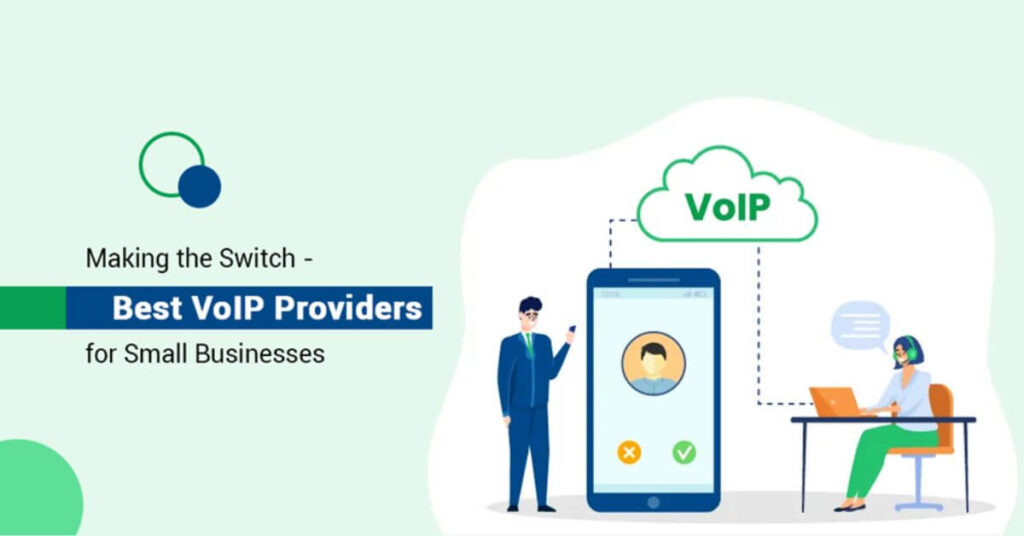Best VoIP Providers for Small Businesses – Thanks to the internet, many aspects of our life have vastly improved. One of them being VoIP. Without it, we still would be overpaying for international calls. But ever since it popped up on the scene three decades ago, the way we communicate has changed forever.
VoIP providers have brought about a communication revolution that has let small businesses communicate smarter, faster, and more efficiently, all while saving money. But picking the right VoIP service provider is easier said than done. Countless options, their pricing structures, call quality, integrations – and the list goes on.
To help you with this ordeal, we’ll introduce you to the top three VoIP providers that are perfect for small businesses. But first, let’s start with the basics.
Table of Contents
How Does VoIP Work?
VoIP stands for Voice Over Internet Protocol, which as the name suggests, means you can make calls over the Internet instead of relying on traditional landline networks. You have to connect your phone to the router so you can take calls over the internet.
A few of the advantages of VoIP are that it provides superior call management functionality, call conferencing, and cheaper calls compared to landline calls. VoIP converts audio signals into digital signals, compresses them, and sends them over the internet. It will be your VoIP provider that will manage and set up the call for you.
VoIP bypasses the landline network provider completely because the phone connects to a switch or router in your local area network (LAN). And when you dial a phone number over the internet, your IP phone tells your VoIP provider to make the call.
Your VoIP provider establishes the call and transmits the data packets to the receiver. Your VoIP device converts these packets to audio signals so you can hear the other person. This is basically how every VoIP network operates.
Now that we have looked at how VoIPs work and the advantages they offer over traditional landline networks, it is time to check out the three best VoIP providers that every small business should consider.
Best VoIP Providers for Small Businesses
1. Axvoice
Axvoice has the best internet calling plans for the USA and Canada and has made its mark in both small business space and residential departments.
Having been widely known as the best value VoIP, I knew I simply had to include Axvoice in the list of best VoIP plans for small businesses. The service makes it easy to switch from a regular PTSN network to an Internet voice calling network – thanks to Axvoice’s advanced trademark communications technology suite.
It means the same features that small businesses get now are offered at even lower prices because the platform is scalable and doesn’t need special hardware to set up separately. But you will still be getting all the advanced features that made Axvoice famous.
These include clear voice, conference calls, multiple phone lines, and voicemail and account management. But, that is not all. You will also get 1500 minutes to call any number within the US and Canada.
But what about if you want to call other Axvoice numbers? Well, along with free in-network calling, the service has call forwarding and advanced call logs so you don’t have to worry about roaming charges, hidden fees, or international call taxes for each country.
If you go for the separate monthly package, it will cost you $40 monthly. But if you pick Axvoice’s best-value deal, you will have to pay $30 per month for the whole year, which is a very competitive price. With this, you get free hardware, free setup, and free activation on your phone.
You also have the option to set up a new number or port an existing number onto Axvoice’s service, without affecting the video or call quality.
All you need is a decent internet connection, an Ethernet port on your Wi-Fi router that’s not in use, and a touchtone phone. The Ethernet port connects the router to the Axvoice device to enable VoIP calling.
2. RingCentral
RingCentral is a user-friendly VoIP with many advanced features specially focused on small businesses. It has a quick and easy installation and setup process and has great integration with hybrid and remote teams.
During my testing, the sound quality was good and the video was pretty vivid. There was no lag, stuttering, or transmission delay either. RingCentral allows connection with both smartphones and laptops when making video calls which is not necessary when making business audio calls but is always a good thing to have.
There are a few issues with the service though that need to be pointed out. It is not great at bulk calling because it can only handle a few calls at any given moment. And if there are multiple calls, the listener can only answer one call at a time.
So if your business is anticipating a dozen calls at any time and you need to make calls, RingCentral can be problematic for you and not powerful enough to handle all calls efficiently. So it is good for small businesses and entrepreneurs who are in the initial stages of their setup, but not for large-scale operations.
RingCentral also provides text messaging options at the business level because it lets you connect to an existing number or a new toll-free number for your business. The VoIP also offers hardware options including cordless phones, headsets, conferencing tools, etc.
The phones range from $100 to $1300 and you can even lease phones at just $5 per month. But if you are not interested, you can download the app and use it on your desktop or smartphone free of charge.
RingCentral has also used many AI algorithms as part of its cloud services but many businesses haven’t really grasped automation to its full extent so this may be a turn-off for some.
Its lowest cost entry-level Core plan costs $30 per user per month, or $20 per user if you buy an annual subscription. It includes unlimited local calling, interactive voice response, video conferencing calls that can include up to an impressive 100 participants, and integration with Google Workplace, Microsoft 365, and Slack.
3. Nextiva
Nextiva is a famous VoIP service that offers unlimited calls in the US and Canada. It also provides texting capability and business numbers that are toll-free for easier communication for small businesses.
It has an old-school approach to communication so it also provides a free faxing option as well. It also allows for unlimited video calls but they are limited to 45 minutes per session. It is also not suited for small businesses because it has extra features that most small setups do not require.
And if you want to access more software integration and app usage, you need to upgrade to the Professional tier which is much costlier than its basic version. But where the VoIP shines, is its call integration and call management hub.
Nextiva allows quick and easy integration for teams working hybrid or remotely. The software was fast and smooth to download and install on a desktop and smartphone.
Nextiva also provides hardware phones that you can buy directly from their website. The brands available on its website include Yealink, Cisco, and Poly which start from $90 and can be leased for less than $4 a month.
Nextiva also offers video and audio conferencing options, multiple conference rooms for video calls, and streamlined one-on-one messaging functionality for team members. You can quickly access a calendar, file attachments, and integration options, and swiftly share various data and findings with your team members.
Who is the Winner?
Remember that the “best” one depends on what your unique business needs are. So take your time, think about what you really need, and don’t be shy about asking these providers for some guidance. Whether you’re all about saving money, need advanced features, or want crystal-clear calls, there’s a VoIP provider out there that’s the perfect fit for you.

Pradeep Sharma is a author the mind behind Techjustify, where I craft insightful blogs on technology, digital tools, gaming, AI, and beyond. With years of experience in digital marketing and a passion for tech innovation, I aim to simplify complex topics for readers worldwide.
My mission is to empower individuals with practical knowledge and up-to-date insights, helping them make informed decisions in the ever-evolving digital landscape.


